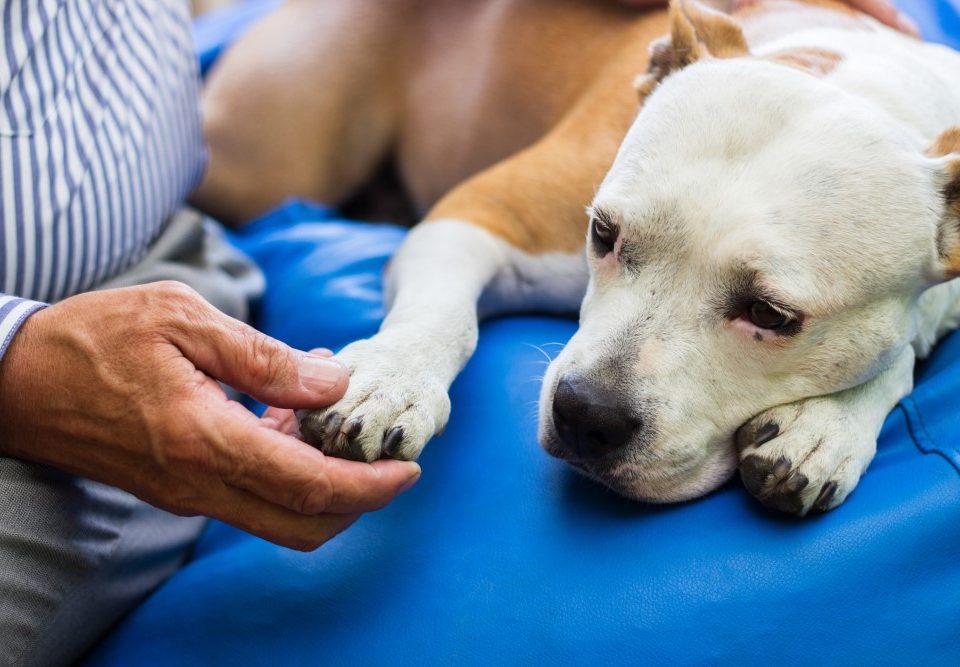
My big dog is getting weak on his back legs – what should I do?
March 9, 2022
How to care for your senior pets?
April 6, 2022Introduction
The kidneys are some of the most vital organs in our dogs’ bodies. They constantly filter our dogs’ blood, removing toxins and making sure that the balance of electrolytes and other vital substances is kept at just the right level.
Sadly, there are many different reasons why our dog’s kidneys stop working as well as they should. The most common cause is an age-related degeneration in the kidney, which slowly worsens over time. Other examples of illnesses that can lead to kidney problems include kidney stones, certain infections (such as Lyme disease or Leishmania), cancer, or even a genetic issue with the kidneys in young dogs.
“Kidney Disease” is the general name for the changes that happen when the kidneys stop working properly.
What are the symptoms of kidney disease in dogs?
There are many different symptoms that can be seen with kidney disease. These include:
- Drinking more
- Urinating more
- Quietness (lethargy)
- Weight loss
- Eating less
- Vomiting
- Loose stools OR constipation
In the early stages, the symptoms may come and go and are often mild. In more advanced kidney disease, the symptoms may be present most or all of the time and may be more severe.
How would my vet diagnose my dog with kidney disease?
If your dog is showing any signs of kidney disease, then your vet will need to examine them thoroughly. This will include feeling around their kidneys for any changes in size or shape.
However, kidney problems cannot be diagnosed just by examining a dog – blood and urine tests are needed. If your dog is drinking and urinating more, it is helpful to bring a fresh urine sample with you to your appointment with your vet.
Once your vet has identified that there is a problem with your dog’s kidneys, they may also suggest doing some more specialised blood tests, or having a look at the kidneys via ultrasound or x-ray, to try and work out the cause of your dog’s kidney problems.
How is kidney disease treated in dogs?
There are many different treatments that can be useful for dogs with kidney disease. However, your dog may not need all of them – your vet will tailor the treatment according to your dog’s own symptoms.
Treat The Cause
If your vet has identified a cause for your dog’s kidney disease, then they may suggest trying to treat this. The exact treatment will depend on the underlying cause. However, if your vet has diagnosed your dog with age-related kidney disease, then sadly there is no specific treatment for this.
Special Diets
If your dog’s kidney disease is advanced enough, then your vet may recommend that they try a special diet to help support their kidneys. These diets can help to relieve the symptoms of kidney disease and can help dogs’ kidneys to cope better for longer, which increases their life expectancy. However, it is important for dogs to only be fed these special diets – not any other food – or they will not work properly.
Regular Drinking
Dogs with kidney disease need to drink and urinate more often, which means they are prone to getting dehydrated. Always make sure that your dog has clean water available to drink – ideally in more than one place, in case one bowl runs out.
It is also best to feed them wet food, as this has a naturally higher moisture content. You can even add a little extra warm water to their food at each meal to increase their fluid intake.
Treat The Symptoms
There are a variety of different medications available that can help to reduce the symptoms of kidney disease. For example, your vet can offer medication to treat your dog’s nausea, improve their appetite, or settle any diarrhoea or constipation that they might experience. It’s best to treat these things early, so don’t hesitate to ask your vet if you feel your dog would benefit from this.
Blood Pressure Medication
Dogs with kidney disease are prone to high blood pressure. Your vet can monitor your dog’s blood pressure and will recommend medication if necessary. High blood pressure can cause extra damage to the kidneys, so it is important to treat this quickly and effectively.
Reduce Protein Loss
Some dogs with kidney disease will lose small amounts of protein through their urine. If this happens, then it can damage the kidneys even more, and cause your dog to lose weight more quickly. Your vet can monitor the protein levels in your dog’s urine and can then recommend starting an appropriate medication if necessary.
What is the prognosis for a dog with kidney disease?
Sadly, kidney disease in dogs is a life-limiting condition. In one study, the average survival time for dogs with age-related kidney disease was around seven and a half months. However, this is only an average – some dogs will live for longer (a year or more) but sadly some dogs will not live even that long.
As you might expect, dogs who have milder kidney disease when they were diagnosed will live longer than those whose disease is more severe. We also know that dogs who are treated diligently and monitored closely for their kidney disease are also likely to live for longer.
Saying goodbye to your dog with kidney disease
It is unusual for dogs who are suffering from kidney disease to pass away by themselves. This means that you and your vet will have to monitor your dog’s quality of life carefully and decide when the right time for euthanasia is.
Measuring your dog’s quality of life can be very difficult, but there are some questions that you can consider to help you make that decision:
- Is your dog still eating normally?
- Is your dog still managing to go for walks?
- Is your dog enjoying spending time with you and your family?
- Is your dog struggling with the symptoms of their illness?
It is important to weigh up the good and bad parts of your dog’s daily life, to try and work out whether they still have a life that is “worth living”. They may still have some things in life that they enjoy, but if they are spending most of their time feeling sick, then you may need to take the decision to let them go.
It can be very difficult to think about losing your pet, but you may find it easier when the time comes if you have planned and prepared in advance. Consider where you would like your pet to pass away when the time comes, who you would like to be present, and what you would like to happen with their body afterwards. You may wish to discuss these choices with the rest of your family, to make sure that everyone is prepared.
Conclusion
Kidney disease can cause a variety of different symptoms. Sadly, it is often not possible to cure the underlying cause, but there are a variety of treatments available to help manage the symptoms and reduce the risk of complications. It is important to monitor your dog’s quality of life closely if they are suffering from kidney disease, as sadly you will likely need to make the difficult decision to let them go when the burden becomes too great for them to bear.




